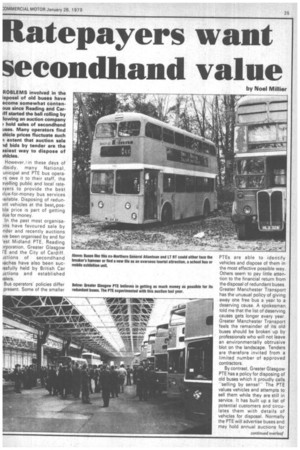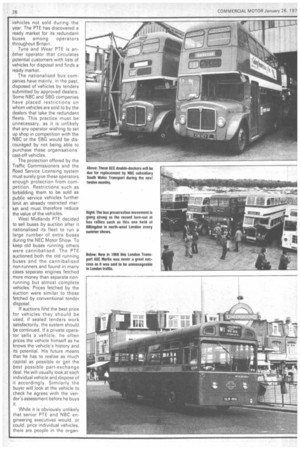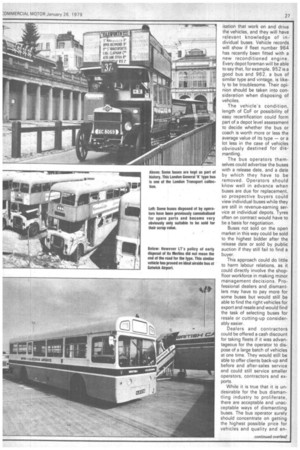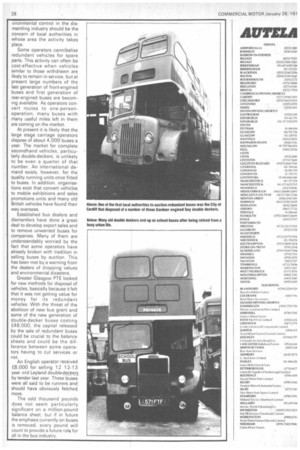Ratepayers want secondhand value
Page 27

Page 28

Page 29

Page 30

If you've noticed an error in this article please click here to report it so we can fix it.
by Noel Maher
ROBLEMS involved in the isposal of old buses have ecome somewhat contenous since Reading and Cariff started the ball rolling by llowing an auction company ) hold sales of secondhand uses. Many operators find shicle prices fluctuate such extent that auction sale id bids by tender are the asiest way to dispose of
3hfcles.
However,' in these days of Jlosidy, many National, unicipal and PTE bus operars owe it to their staff, the welling public and local rate)yers to provide the best ilue-for-money bus services (ailable. Disposing of redunint vehicles at the best, posble price is part of getting due for money.
In the past most organisa)ns have favoured sale by nder and recently auctions ive been organised by and for 'est Midland PTE, Reading )rporation, Greater Glasgow FE and the City of Cardiff. Jctions of secondhand ;aches have also been sucissfully held by British Car Jctions and established ;alers.
Bus operators' policies differ present. Some of the smaller PTEs are able to identify vehicles and dispose of them in the most effective possible way. Others seem to pay little attention to the financial return from the disposal of redundant buses. Greater Manchester Transport has the unusual policy of giving away one free bus a year to a deserving cause. A spokesman told me that the list of deserving causes gets longer every year. Greater Manchester Transport feels the remainder of its old buses should be broken up by professionals who will not leave an environmentally obtrusive blot on the landscape. Tenders are therefore invited from a limited number of approved contractors.
By contrast, Greater Glasgow PTE has a policy for disposing of old buses which it proudly calls "selling by sense!" The PTE values vehicles and attempts to sell them while they are still in service. It has built up a list of potential customers and .circulates them with details of vehicles for disposal. Normally the PTE will advertise buses and may hold annual auctions for
vehicles not sold during the year. The PTE has discovered a ready market for its redundant buses among operators throughout Britain, Tyne and Wear PTE is another operator that circulates potential customers with lists of vehicles for disposal and finds a ready market.
The nationalised bus companies have mainly, in the past, disposed of vehicles by tenders submitted by approved dealers. Some NBC and SBG companies have placed restrictions on whom vehicles are sold to by the dealers that take the redundant fleets. This practice must be unnecessary, as it is unlikely that any operator wishing to set up shop in competition with the NBC or the SBG would be discouraged by not being able to purchase these organisations' cast-off vehicles.
The protection offered by the Traffic Commissioners and the Road Service Licensing system must surely give these operators enough protection from competition. Restrictions such as forbidding them to be sold as public service vehicles further limit an already restricted market and must therefore reduce the value of the vehicles.
West Midlands PTE decided to sell buses by auction after it nationalised its fleet to run a large number of extra buses during the NEC Motor Show. To keep old buses running others were cannibalised. The PTE auctioned both the old running buses and the cannibalised non-runners and found in many cases separate engines fetched more money than separate non running but almost complete vehicles. Prices fetched by the auction were similar to those fetched by conventional tender disposal.
If auctions find the best price for vehicles they should be used, if sealed tenders work satisfactorily, the system should be continued. If a private opera tor sells a vehicle, he often prices the vehicle himself as he knows the vehicle's history and its potential. His future means that he has to realise as much capital as possible or get the best possible part-exchange deal. He will usually look at each individual vehicle and dispose of it accordingly. Similarly the buyer will look at the vehicle to check he agrees with the vendor's assessment before he buys it While it is obviously unlikely that senior PTE and NBC en gineering executives would, or could, price individual vehicles, there are people in the organ
iSation that work on and drive the vehicles, and they will have relevant knowledge of individual buses. Vehicle records will show if fleet number 964 has recently been fitted with a new reconditioned engine. Every depot foreman will be able to say that, for example, 952 is a .good bus and 962, a bus of similar type and vintage, is likely to be troublesome. Their opinion should be taken into consideration when disposing of vehciles.
The vehicle's condition, length of CoF or possibility of easy recertification could form part of a depot level assessment to decide whether the bus or coach is worth more or less the average value of its type — or a lot less in the case of vehicles obviously destined for dismantling.
The bus operators themselves could advertise the buses with a release date, and a date by which they have to be removed. Operators should know well in advance when buses are due for replacement, so prospective buyers could view individual buses while they are still in revenue-earning service at individual depots. Tyres often on contract would have to be a basis for negotiation.
Buses not sold on the open market in this way could be sold to the highest bidder after the release date or sold by public auction if they still fail to find a buyer.
This approach could do little to harm labour relations, as it could directly involve the shopfloor workforce in making minor management decisions. Professional dealers and .dismantlers may have to pay more for some buses but would still be able to find the right vehicles for export and resale and would find the task of selecting buses for resale or cutting-up considerably easier.
Dealers and contractors could be offered a cash discount for taking fleets if it was advantageous for the operator to dispose of a large batch of vehicles at one time. They would still be able to offer clients back-up and before and after-sales service and could still service smaller operators, contractors and exports.
While it is true that it is undesirable for the bus dismantling industry to proliferate, there are acceptable and unacceptable ways of dismantling buses. The bus operator surely should concentrate on getting the highest possible price for vehicles and quality and en vironmental control in the dismantling industry should be the concern of local authorities in whose area the activity takes place.
Some operators cannibalise redundant vehicles for spare parts. This activity can often be cost-effective when vehicles similar to those withdrawn are like.ly to remain in service, but at present large numbers of the last generation of front-engined buses and first generation of rear-engined buses are becoming available. As operators convert routes to one-personoperation, many buses with many useful miles left in them are coming on the market.
At present it is likely that the large stage carriage operators dispose of about 4,000 buses a year. The market for complete secondhand vehicles, particularly double-deckers, is unlikely to be even a quarter of that number. An international demand exists, however, for the quality running units once fitted to buses. In addition, organisations exist that convert vehicles to mobile exhibitions and sales promotions units and many old British vehicles have found their way overseas.
Established bus dealers and dismantlers have done a great deal to develop export sales and to remove unwanted buses for companies. Many of them are understandably worried by the fact that some operators have already broken with tradition in selling buses by auction. This has been met by a warning from the dealers of dropping values and environmental disasters.
Greater Glasgow PTE looked for new methods for disposal of vehicles, basically because it felt that it was not getting value for money for its redundant vehicles: With the threat of the abolition of new bus grant and some of the new generation of double-decker buses costing £48,000, the capital released by the sale of redundant buses could be crucial to the balance sheets and could be the difference between some operators having to cut services or not.
An English operator received £8,000 for selling 12 12-13 year old Leyland double deckers by tender last year. These buses were all said to be runners and should have obviously fetched, more.
The odd thousand pounds does not seem particularly significant on a million-pound balance sheet, but if in future the emphasis currently on buses is removed, every pound will count to provide a future role for all in the bus industry.












































































































